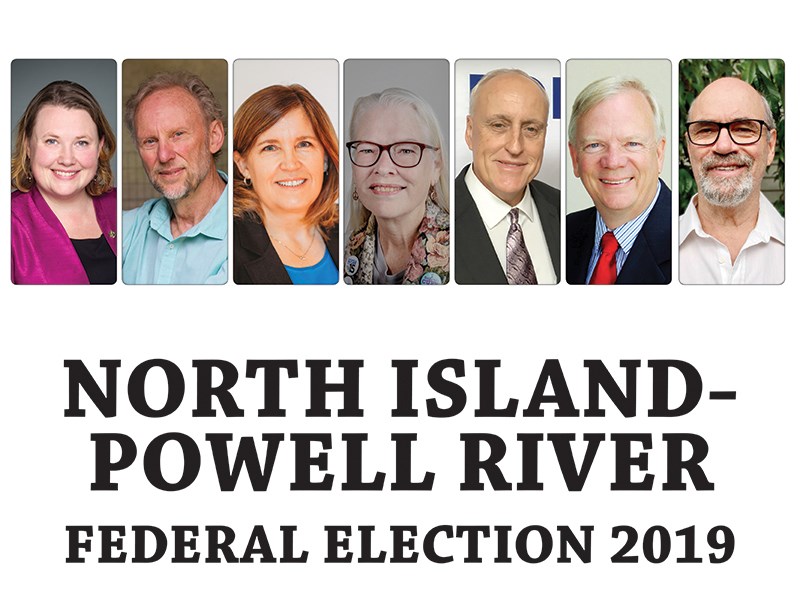Candidates running in the North Island-Powell River riding in this year’s federal election are split between those who support more public investment in housing programs, and those who want to prioritize cutting other costs of living to make more household income available for rent and home ownership.
Housing affordability remains a critical issue in the local area, with the Canadian Rental Housing Index rating qathet Regional District as “severely unaffordable” for households earning up to $19,351, and “unaffordable” for those earning up to $33,176.
The Liberal government’s National Housing Strategy (NHS), unveiled in 2017, pledged to build 125,000 new housing units and refurbish more than 300,000 public units across Canada over 10 years, with the goal of reducing chronic homelessness by 50 per cent. Canada Mortgage and Housing Corporation administers the program, using federal provisions for funding, grants and loans.
“The NHS includes a $13.2 billion co-investment fund that will create and repair affordable housing across Canada for those with the greatest need,” said Liberal Party candidate Peter Schwarzhoff, also noting that Linda’s Place, a 27-unit affordable housing complex in Campbell River, is currently under construction.
“While we’re focused on helping to make housing more affordable for middle-class Canadians, Conservatives continue to look out for the wealthiest one per cent,” added Schwarzhoff.
However, both the NDP’s Rachel Blaney and the Green Party’s Mark de Bruijn said the NHS has so far made unacceptably slow progress.
“The pace of the rollout has been completely inadequate,” said Blaney. “Currently we have people living in tents in the yards of friends and family, and bidding wars on the few available rental units, which leads to people spending 50 or 60 per cent of their income on rent.”
The NDP promises to construct 500,000 new units of affordable housing over 10 years (starting with an immediate $5 billion investment), and pledges to create a $5,000 per year renter’s benefit if the party forms the next federal government.
“We would fund this by addressing the fact that many of the wealthiest Canadians aren’t paying their fair share of taxes,” explained Blaney. “Right now many everyday workers in Canada are paying more tax than the ultra rich.”
de Bruijn pointed out that the Parliamentary Budget Officer found the NHS largely maintains current spending levels for housing programs, and actually reduces targeted funding for those most in need.
“So far, the actual goals of the NHS are vague, have few target dates, and do not guarantee that low-income households or affordable housing stocks are the primary beneficiaries of this plan,” said de Bruijn.
The Greens’ target is to build 250,000 new affordable housing units and refurbish 150,000 existing units over 10 years, while increasing the National Housing Co-Investment Fund by $750 million for new builds and the Canada Housing Benefit by $750 million for rent assistance.
Marxist-Leninist Party candidate Carla Neal, meanwhile, proposes a complete overhaul of the way housing is provided.
“First and foremost, housing is a right,” she said. “That requires government action. The private sector is not going to do that.”
Neal said dealing with long-term homelessness is ultimately far more expensive than investing in public housing, and argues the federal government should provide safe and secure accommodation for all, regardless of income.
“What we need is housing that isn’t only going to be affordable for people living above the poverty line,” added Neal.
The Conservative Party’s Shelley Downey and the People’s Party’s Brian Rundle also said the NHS is inadequate, but argued that the federal government’s focus should be on reducing the overall cost of living, therefore leaving more household income available to pay for rent and mortgages.
“With his poor judgement and tax hikes, Justin Trudeau has put the dream of home ownership further out of reach for so many, especially young Canadians,” said Downey. “Liberals have been very generous sending our tax dollars out of the country and neglecting the expenditure of dollars for our needs here at home. Housing is one of these needs and it is a need across our whole riding.”
Downey did not say whether a Tory government would build more social housing units, but noted her party plans to look into easing rules for mortgage tests and making unused federal lands available for housing developments.
Rundle said the federal government should focus on boosting the economy.
“Most of the federal housing programs do not address the extreme high cost and quickly rising prices of housing on the west coast,” he said. “The main thing that needs to be done here is create a vibrant growing economy that creates good paying jobs and programs to allow young people and families to get into the housing market.”
In an email to the Peak, independent candidate Glen Staples said many factors contribute to increased housing prices, including: Airbnb taking housing off the local market, which requires tourism services that need workers who are short of the same housing; many larger houses are under occupied; a skilled labour shortage makes building more expensive; land prices and zoning; higher expectations from consumers; and excessive regulation.
“There have been so many regulatory changes in construction, all of which increase the cost of housing, safety, building code, environmental engineering, etc,” said Staples, a journeyman carpenter. “On some issues, such as GHG emissions and finance, we need more regulation; in construction we need less.”
Staples said he is in favour of moving back to a having people be more self-reliant with less “nanny state” government trying to do too many things directly.
“Market forces will correct prices in time,” he added. “However, the government does have a role in regulation.”



